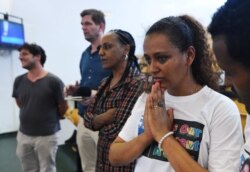An Italian court has ruled that an Eritrean man, Medhane Tesfamariam Berhe, who was thought to be a human trafficking kingpin is a victim of mistaken identity, but he now faces deportation.
Medhane had been imprisoned in Italy since 2016, when he was extradited from Sudan. For more than three years, Italian prosecutors claimed he masterminded an elaborate human trafficking ring, resulting in the deaths of hundreds of migrants crossing the Mediterannean Sea. They sought a 14-year prison sentence.
But soon after his arrest, family members, and Medhane’s attorney, claimed he had been mistaken for another man who shares his first name, Medhane Yehdego Mered, a widely known trafficker nicknamed “The General.”
In the years since his arrest, DNA evidence, vocal analysis and eyewitness testimonies have all supported Medhane’s innocence. But Italian prosecutors, who believed they had nabbed a high-profile trafficker, pressed on.
Mistaken identity
Friday, a panel of judges agreed with Medhane and his family, conceding that Italian authorities, with the help of Britain’s National Crime Agency, had apprehended the wrong person.
But Medhane’s ordeal is far from over. The judges ruled that he had abetted traffickers and sentenced him to time already served and a fine of more than $100,000. Following the verdict, authorities moved Medhane to a detention center in Palermo, a coastal city in Sicily. He could face deportation, either to his native Eritrea or Sudan, his lawyer, Michele Calantropo, said.
Calantropo told VOA on Friday that he did not know where his client was being taken but was planning an appeal. “I'm looking for my client at 10 p.m. in my city because I don’t know where the police are bringing my client,” Calantropo said shortly after the verdict was made public. “My client isn’t Sudanese, and with Eritrea, we have no agreement for it. I mean it’s impossible [to deport him there],” he added.
‘Until the last hour’
Medhane’s sister traveled from Norway to support her brother. Speaking earlier in the day, she said she hoped his ordeal would come to an end, but was prepared for anything. “We weren’t sure what the verdict would be, and we didn’t know what to expect from the Italian system,” Hiwet Tesfamarian Berhe told VOA, speaking in Tigrigna. She said she only wanted to “to hug and kiss” her brother, who she has always known to be innocent.
“We are going to ask to clear his name until the last hour,” Hiwet said.
Since just after his arrest, evidence has accumulated to support Medhane’s innocence, including a DNA sample submitted by his mother and accounts of trafficking victims who said they did not recognize Medhane.
Failing strategy
Lorenzo Tondo, a Guardian correspondent who covers Italy and the migration crisis, said Medhane’s case sheds a harsh light on the Italian legal system and the strategies used to prosecute traffickers.
“This is just an example of how European Union strategy, all the European Union countries’ strategy, is failing,” Tondo told VOA. “We’re just getting everything wrong in the way we are trying to deal with the migration crisis,” he added. “This case proves that we cannot apply on human trafficking the same strategy that we applied to fight criminal organizations.”
Tondo said investigators made many mistakes due to language barriers, a lack of presence in Africa and fundamental misunderstandings of how migration works. He said they tried to use the same strategies used to infiltrate the mafia, relying on informants and wiretaps. The result, Tondo said, was only added confusion.
“This is not just a case of mistaken identity,” Tondo said.
“This is a case that proves that we are getting everything all wrong in chasing human traffickers.”





